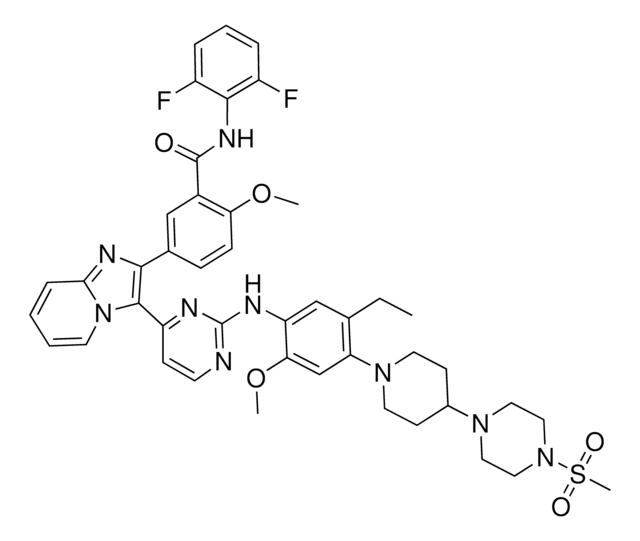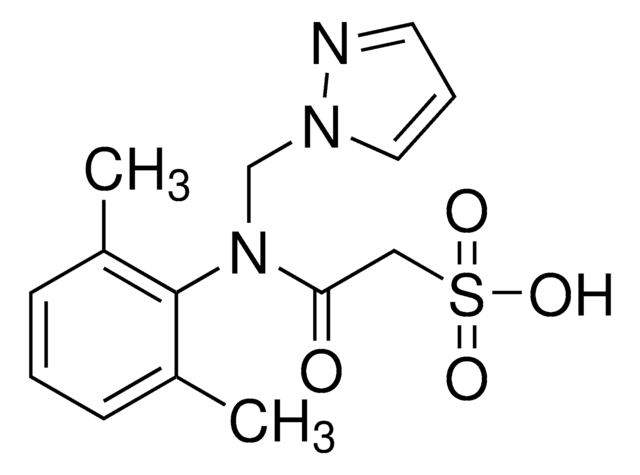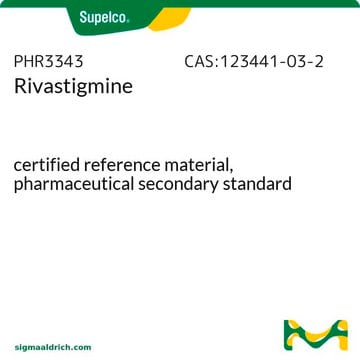SML2783
VU0409551
≥98% (HPLC)
Synonym(s):
JNJ 46778212, JNJ-46778212, VU 0409551, [6,7-Dihydro-2-(phenoxymethyl)oxazolo[5,4-c]pyridin-5(4H)-yl](4-fluorophenyl)methanone
Sign Into View Organizational & Contract Pricing
All Photos(1)
About This Item
Empirical Formula (Hill Notation):
C20H17FN2O3
CAS Number:
Molecular Weight:
352.36
MDL number:
UNSPSC Code:
12352200
NACRES:
NA.77
Recommended Products
Quality Level
Assay
≥98% (HPLC)
form
powder
color
white to beige
solubility
DMSO: 2 mg/mL, clear
storage temp.
2-8°C
SMILES string
O=C(N1CCC2=C(C1)OC(COC3=CC=CC=C3)=N2)C4=CC=C(C=C4)F
Biochem/physiol Actions
VU0409551 (JNJ-46778212) is an orally available, potent and selective biased metabotropic glutamate receptor subtype 5 positive allosteric modulator (mGlu5 PAM). VU0409551 (JNJ-46778212) selectively potentiates mGlu5 coupling to Gaq-mediated signaling without modulation of NMDAR currents in hippocampal neurons. VU0409551 exhibits potent antipsychotic-like and cognition enhancing activity in animal models.
Storage Class Code
11 - Combustible Solids
WGK
WGK 3
Flash Point(F)
Not applicable
Flash Point(C)
Not applicable
Certificates of Analysis (COA)
Search for Certificates of Analysis (COA) by entering the products Lot/Batch Number. Lot and Batch Numbers can be found on a product’s label following the words ‘Lot’ or ‘Batch’.
Already Own This Product?
Find documentation for the products that you have recently purchased in the Document Library.
Jerri M Rook et al.
Neuron, 86(4), 1029-1040 (2015-05-06)
Schizophrenia is associated with disruptions in N-methyl-D-aspartate glutamate receptor subtype (NMDAR)-mediated excitatory synaptic signaling. The metabotropic glutamate receptor subtype 5 (mGlu5) is a closely associated signaling partner with NMDARs and regulates NMDAR function in forebrain regions implicated in the pathology
Shane D Hellyer et al.
Journal of neurochemistry, 151(3), 301-315 (2019-08-04)
Allosteric modulators of metabotropic glutamate receptor 5 (mGlu5 ) are a promising therapeutic strategy for a number of neurological disorders. Multiple mGlu5 -positive allosteric modulator (PAM) chemotypes have been discovered that act as either pure PAMs or as PAM-agonists in
Darrick T Balu et al.
Neuropsychopharmacology : official publication of the American College of Neuropsychopharmacology, 41(8), 2052-2061 (2016-01-08)
There is substantial evidence that NMDA receptor (NMDAR) hypofunction contributes to the pathophysiology of schizophrenia (SCZ). A recent large-scale genome-wide association study identified serine racemase (SR), the enzyme that produces the NMDAR co-agonist D-serine, as a risk gene for SCZ.
Our team of scientists has experience in all areas of research including Life Science, Material Science, Chemical Synthesis, Chromatography, Analytical and many others.
Contact Technical Service







